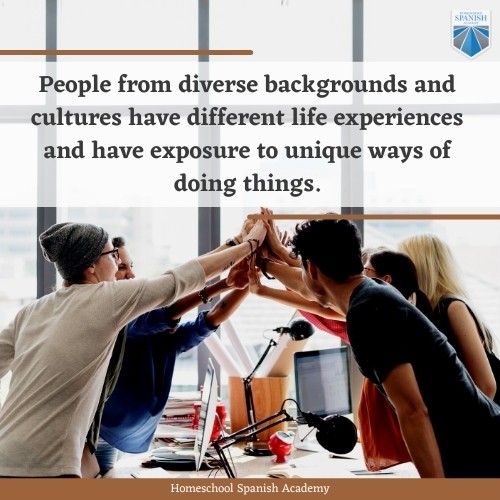
The Insider’s Scoop About the Modern Workplace
Companies are looking to hire employees who have an understanding of other cultures and have the ability to communicate with people from different backgrounds.
First Off – What Is Culture?
Per the Oxford Dictionary, Culture is defined as “the ideas, customs, and social behavior of a particular people or society.”
Moreover, culture includes a group that we are born into – such as race, gender, socioeconomic class, national origin, or religion. It is also comprised of the circles we are associated with through relocation, a change in economic status, or by experiencing a disability.
Why Does Your Employer Care If You Can Communicate Cross-Culturally?

People from diverse backgrounds and cultures have different life experiences and have exposure to unique ways of doing things. These differences enhance the workplace culture by uniting thinkers who can look at business problems from varied perspectives and other information processing styles, which, in turn, leads to solving problems with uncommon solutions.
We look up at the same stars, and see such different things.”
George R.R. Martin, Author
If your entire team at work consists of people from the same ‘culture’ (as defined above) – then it is highly likely that their problem-solving techniques and project recommendations will be the same. This is not a sustainable approach for competing in the global marketplace. Businesses need unique perspectives to stay competitive. At work, we are told to think ‘outside the box’ – this can be done by comprising teams of diverse backgrounds who have different viewpoints.
The USA has an exceptionally diverse talent pool which is comprised of many cultures. According to the US Census Bureau, as of July 2018, 18.1% of Americans are of Hispanic or Latino descent. Also, there are 41 million Spanish speakers in the USA, and Spanish is the most studied foreign language.
In summary, “A diverse workforce also generates diverse ideas, and diverse ideas help your company out-think the competition. In fact, the next billion dollar idea may come from a background none of your employees have yet.” Refer to this article for further reading.
How Diverse Should Your Company Be?
This question is answered eloquently in this Human Resources article,
“Your organization should be as diverse as your customer base. The important inverse of this is that your customer-base can only be as diverse as your organization.”
A Canadian think tank developed an index to rank companies on Diversity & Inclusion (D&I) back in 2016. This D&I Index ranks the top 100 publicly traded companies across the globe and measures 24 areas across four categories; Diversity, Inclusion, People Development and News Controversies. These are the Top 10 most Diverse companies in 2018,
- Accenture PLC
- Novartis AG
- Medtronic PLC
- Diageo PLC
- Gap Inc
- Telecom Italia SpA
- Kering SA
- Natura Cosmeticos SA
- L’Oreal SA
- Acciona SA
What Is Your Employer Looking For?
Adaptability & Flexibility
A few years ago, I had the experience of negotiating aerospace subcontracts in India. On one particular trip, I was sitting across the table from a subcontractor’s Program Manager, Finance Manager, and Lead Engineer when suddenly the lights flickered. My first reaction was to worry that there was an impending earthquake and I need to run to the sturdiest doorway! Then I remembered my previous experiences traveling to developing countries and the fact that power can be unreliable. The lights continued to flicker on and off until it became dark outside-and then they went out for the rest of the evening. We still hadn’t reached a negotiation agreement but had to press on – our faces illuminated only by the light of our cell phones. It is imperative to have the ability to adapt to unique circumstances without skipping a beat.
- Agreement on Terms and Conditions – Check.
- Unique experience – Check.
- Didn’t miss a beat and closed the deal – Check!
Employers are perusing résumés to determine if the applicant has experience with other cultures, thereby making them capable of adapting to different business climates, interacting with people of different backgrounds, and building relationships with people from/located in other quadrants.
Willingness to Listen and Learn
Employers want to hire people who are open-minded and willing to learn – not those who protest against company culture or other employees. One way to learn to be more open-minded is to have exposure to people who think differently than you. Refer to our blog to learn more on cultural competency.
According to an article on being culturally literate,
“Developing [employees who are] culturally literate and aware can enhance communication, productivity, and unity in the workplace. And when these employees deal with foreign employees [who are culturally literate and aware] … there will be little to no misunderstandings…[because] they can understand others who are different from them.”
Unique Problem-Solving Skills
Other ways to become more open-minded is by taking classes in new subjects that challenge your perceptions and thoughts, attend a cultural celebration different from your culture, listen to what people have to say so you can learn new perspectives, or pay attention to nuances that make someone different than you.
Companies often want to take successful products and ideas from one market and move them to another; however, these well-intentioned plans often go awry. Nothing highlights this better than the Chevrolet Nova. This small automobile had success in the American market, and Chevy executives wanted to prosper in Latin America as well. It is safe to assume that the Chevy marketing team did not include a Spanish speaker because if they had, the Chevy Nova would have never landed in South America.
‘Nova’ in Spanish is two separate words, no va – and this literally means ‘it doesn’t go.’ Who wants to buy a car that doesn’t go? The company was able to recover from this misnomer, but the lesson remains – know your market.
There is no better way to understand your business environment than to have a team comprised of people who grasp the local economy first hand!
According to an international business school article,
“Understanding local laws, regulations, and customs, as well as the competitive landscape, can help a business to thrive. Moreover, local connections, native language skills, and cultural understanding can boost international business development exponentially.”
Furthermore, research from consulting firm McKinsey & Company analyzed 366 public companies across industries in Canada, United States, Latin America, and the United Kingdom and found that highly diverse companies “are 35 percent more likely to have financial returns above their respective national industry medians.”
How Do You Highlight Your Uniqueness On Your Résumé?
- Add study/work abroad and extended travel experiences on your résumé – it inherently implies that you have been put in situations where you became self-reliant and made adjustments to adapt to circumstances in each unique place.
- List additional languages that you speak as well as your proficiency level – even if you are just starting out – because it shows interest in culture.
- Include any professional affiliations and cultural organizations that you are a part of
- Highlight interdisciplinary and multicultural teams that you’ve contributed to
Are You Lacking These Experiences?
It is OK if you cannot add any of the above to your résumé today because you can also become more culturally aware through other avenues.
One way is by interfacing with people from other countries! Spanish is the most prudent language to learn so that you can interface with people in 21 other countries and 41 million people in your own backyard!
Another way to learn Spanish is to sign up for online classes with instructors located in Antigua, Guatemala who are ready to share about culture, colloquial words and their everyday life experiences!
You could also check the ‘travel’ box by visiting Guatemala as your next travel destination!

Want more free Spanish lessons, fun content, and easy learning strategies? Check these out!
- Celebrating Culture and Joy: The Magic of Carnival in Spanish-Speaking Countries
- 15 Mouth-Watering National Dishes of Latin America
- Discovering The Mayan Languages
- The 10 Most Common Spanish Surnames in The U.S
- Everything About Mexican Christmas Traditions
- What Is the Hispanic Scholarship Fund? Is It Legit?
- A Spanish Guide to Thanksgiving Food Vocabulary
- How Did All Saints Day Celebrations Started?
- 15 Super Popular Spanish Songs for Kindergarten - January 24, 2023
- 11 Native Spanish Shows on Netflix for Teenagers (14+) - April 6, 2021
- The Life and History of Latino Soccer Star Diego Maradona - March 11, 2021




